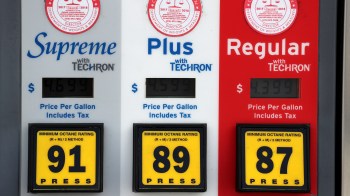New fuel standards could lead to higher gas prices
Kai Ryssdal: You gotta figure that at some point — maybe soon — all those gas-guzzling SUVs out on the roads are gonna disappear. Victims of gas at $5 bucks a gallon, or maybe much more.
The cars of the future are much more likely to be fuel sippers. The White House and U.S. car makers have a deal in place to raise fuel efficiency standards to 54.5 miles per gallon by 2025. But a new report from the Congressional Budget Office today says that change could mean more potholes, or maybe higher gas prices.
Marketplace’s Adriene Hill explains.
Adriene Hill: Every time you fill up your car — one gallon, two gallons — the price ticks up, up, up, impossibly up, you’re also filling up the Federal Highway Trust Fund. The feds collect a tax on each gallon of gas you buy. And so, if your super-cool ride of the future needs less gas…
David Gerard: If you drive the same amount and you’re getting better fuel economy then you’ll use less gas and pay less tax.
David Gerard is an economics professor at Lawrence University.
A new report from the Congressional Budget Office estimates that by 2040, we’ll collectively pay about 20 percent less in federal gas tax. Which is a problem if you’re the feds, because they use that money to fix highways, build mass transit. The feds could raise gas tax prices to make up for the shortfall.
Gerard: But raising gas taxes is not particularly popular politically.
And more taxes would cut into the savings promised by those hyper-fuel-efficient future cars.
Conundrums, conundrums. Is it time to scrap the new miles per gallon standards and resurrect the old Ford Bronco in the garage? Absolutely not, says Deron Lovaas from the Natural Resources Defense Council.
Deron Lovaas: For the past century, the most tried and true revenue tool for transporation at the state and federal level has been gas taxes and that promotes a perverse incentive to use more gasoline.
Lovaas says it’s time for a new way to fund transit. One idea: paying by number of miles you drive, instead of how much gas it took you to drive them.
I’m Adriene Hill for Marketplace.
There’s a lot happening in the world. Through it all, Marketplace is here for you.
You rely on Marketplace to break down the world’s events and tell you how it affects you in a fact-based, approachable way. We rely on your financial support to keep making that possible.
Your donation today powers the independent journalism that you rely on. For just $5/month, you can help sustain Marketplace so we can keep reporting on the things that matter to you.

















